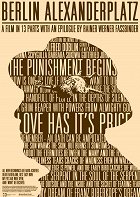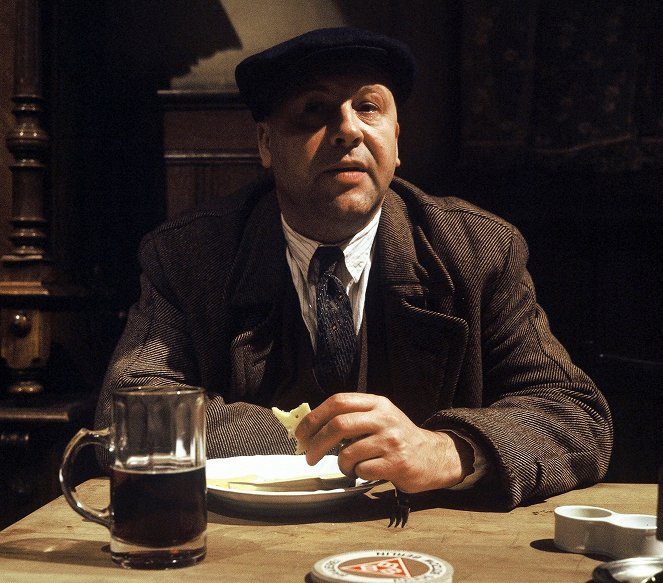Regie:
Rainer Werner FassbinderScenario:
Rainer Werner FassbinderCamera:
Xaver SchwarzenbergerMuziek:
Peer RabenActeurs:
Günter Lamprecht, Karlheinz Braun, Hanna Schygulla, Claus Holm, Franz Buchrieser, Brigitte Mira, Roger Fritz, Gottfried John, Barbara Sukowa (meer)Afleveringen(14)
-
Die Strafe beginnt (E01)
-
Wie soll man leben, wenn man nicht sterben will (E02)
-
Ein Hammer auf den Kopf kann die Seele verletzen (E03)
-
Eine Handvoll Menschen in der Tiefe der Stille (E04)
-
Ein Schnitter mit der Gewalt vom lieben Gott (E05)
-
Eine Liebe, das kostet immer viel (E06)
-
Merke: Einen Schwur kann man amputieren (E07)
-
Die Sonne wärmt die Haut, die sie manchmal verbrennt (E08)
-
Von den Ewigkeiten zwischen den Vielen und den Wenigen (E09)
-
Einsamkeit reißt auch in Mauern Risse des Irrsinns (E10)
-
Wissen ist Macht und Morgenstund hat Gold im Mund (E11)
-
Die Schlange in der Seele der Schlange (E12)
-
Das Äußere und das Innere und das Geheimnis der Angst vor dem Geheimnis (E13)
-
Mein Traum vom Traum des Franz Biberkopf von Alfred Döblin – Ein Epilog (E14)
Samenvattingen(1)
Rainer Werner Fassbinder’s fifteen-hour Berlin Alexanderplatz, based on Alfred Döblin’s great modernist novel, was the crowning achievement of a prolific director who, at age thirty-four, had already made over thirty films. Fassbinder’s immersive epic follows the hulking, childlike ex-convict Franz Biberkopf (Günter Lamprecht) as he attempts to “become an honest soul” amid the corrosive urban landscape of Weimar-era Germany. With equal parts cynicism and humanity, Fassbinder details a mammoth portrait of a common man struggling to survive in a viciously uncommon time. (Criterion)
(meer)Recensie van Dionysos voor deze serie (1)
Berlin Alexanderplatz (1980)
This review contains a spoiler. The only two people he truly loved were Mieze and Reinhold. As has been written elsewhere, Franz is a character that is broken, not only in time, but absolutely – he is constantly torn apart by the world, forced to always rebuild, to find himself again and forget what came before (first his right hand, eventually his soul, but he could not find that again). The greatness of this character lies in his love for Reinhold because that is the world - death - life itself, who has broken free from its commonality and stood in front of our protagonist personally - Reinhold is the embodiment of the world, one that is cruel and treacherous. The experienced Franz, who loves life and the world despite its endless injustices, embraces Reinhold in a gesture of a futile fight against the Unbeatable, which can be tricked exactly by not losing ourselves in love and the fight against it, not losing the will to love those close to us but also the World that enables us all this, even though it takes everything from us. That is precisely why the culmination is the ending of the 13th episode - Franz's laughter at the loss of Mieze is not cynicism, but the highest understanding - Mieze could not defeat Reinhold/Death, but she could lose herself because by denying Franz or leaving him, Reinhold would truly triumph. In the (one-armed) gesture of the embrace of Love and Death, the whole epilogue unfolds, which is an unprecedentedly perfect dialectical play of Death and Life, the guilt of the World before its own cruelty and the guilt of the Human-Franz before from own complicity. /// Without a doubt, Fassbinder created one of his best films, notable even within his filmography, primarily through the multi-layered content and form. The combination of the narrator, intertitles, and "poisonously sweet" music turns the epic of the story into an ironic and stinging poetry of sadness, life’s mistakes, turbulent times, and life itself.
()

